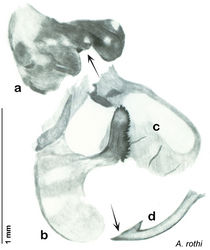Arenivaga rothi
| Notice: | This page is derived from the original publication listed below, whose author(s) should always be credited. Further contributors may edit and improve the content of this page and, consequently, need to be credited as well (see page history). Any assessment of factual correctness requires a careful review of the original article as well as of subsequent contributions.
If you are uncertain whether your planned contribution is correct or not, we suggest that you use the associated discussion page instead of editing the page directly. This page should be cited as follows (rationale):
Citation formats to copy and paste
BibTeX: @article{Hopkins2014ZooKeys384, RIS/ Endnote: TY - JOUR Wikipedia/ Citizendium: <ref name="Hopkins2014ZooKeys384">{{Citation See also the citation download page at the journal. |
Ordo: Blattodea
Familia: Corydiidae
Genus: Arenivaga
Name
Arenivaga rothi Hopkins, 2014 sp. n. – Wikispecies link – ZooBank link – Pensoft Profile
Type locality
MEXICO, Coahuila, 8 mi N Viesca.
Material examined
Holotype: > in EMEC labeled “MEX: Coah., sand dunes at Bilbao, 8 mi. N. Viesca, V-30/31-1981, J. Doyen, J. Liebherr, at blacklight” “HOLOTYPE Arenivaga rothi Hopkins, 2012” [red label with black border].
Paratypes (13): USA: TX, Presidio, May-June 1953, 53-10102, Presidio-3268L, at lights (8, USNM); TX, Presidio, 6/?-8/?/1955, JH Russell, at electric light (1, USNM); TX, Presidio, 6/17/1954, JH Russell, at light, 54-6842, Int. 3399L, (1, HEH); TX, Presidio, 5/14/1944, Presidio 1334, Lot No. 44-16214 (1, LACM). MEXICO: Coahuila, Bilbao 8 mi N of Viesca, 5/30-31/1981, Doyen & Liebherr, on sand at night (2, EMEC); Coahuila, 10 mi E of San Pedro de las Colonias, 7/3/1959, ER Tinkham, low dunes (1, USNM). All paratypes labeled “Paratype Arenivaga rothi Hopkins 2012” [blue label with black border].
Etymology
The name is a noun in the genitive case. This species is named for the late Louis M. Roth who devoted his career to the description of new cockroach species and co-authored Cockroaches: Ecology, Behavior and Natural History.
Distribution
This species is found in north central Mexico in the state of Coahuila up to Presidio County, Texas. See Fig. 140.
Diagnosis
Arenivaga rothi may be distinguished by the very wide gap on the right ventral phallomere and the unusually narrow, pointed head on the genital hook. See Fig. 139.
Description
Male. Measurements. Holotype TL = 21.0 mm, GW = 10.2 mm, PW = 6.64 mm, PL = 4.65 mm, TL/GW = 2.06, PL/PW = 0.70. EW = 0.20 mm; OW = 0.40 mm. Size range among paratypes: TL 17.9–21.8 mm, GW 8.2–10.4 mm, PW 5.70–7.00 mm, PW 4.40–4.82 mm.
Head. Two ocelli large, ovoid and protruding (0.50 ? 0.40 mm); vertex dark brown, with small ridges between apices of eyes and extending onto ocellar tubercles; interocellar space concave, dark brown, light brown medially, with two pale spots medial to base of ocelli. Frons light brown; posterior concave; anterior portion of frons bulbous, light brown; wide light brown anteclypeus. See Fig. 138d.
Pronotum. Pronotum translucent waxy beige; dorsal surface of pronotum with dense very short light orange-brown setae that are thicker and longer laterally; pronotal pattern light orange-brown “hippo face” with little discernible detail; no aura. See Fig. 138c.
Body. Wing brace present. Two tarsal claws present. Legs and body light brown; sternites with small pale maculations and fine lines laterally on each; subgenital plate light orange-brown with darker border; asymmetrical with pointed apices. See Fig. 138b.
Forewings. Wings extended well beyond abdominal apex (up to ~35% of wing length); very pale translucent white-beige or brown; surface translucent and matte or with dull sheen. See Fig. 138a.
Genitalia. Right dorsal phallomere composed of lightly sclerotized, bulbous hook-shaped lobe, articulated with right ventral phallomere on lateral side; central field lightly sclerotized, punctate and deeply foreshortened; medial edge rolled outwards from central field, heavily sclerotized, shagreened to toothed. Small central sclerite lightly sclerotized, finely punctate, concave with posterior rim attaching to dorsal posterior point of dorsal phallomere, anterior end folded posteriorly into wide punctate cup. Right ventral phallomere arises from articulation to form smooth rounded lobe becoming sclerotized and shagreened medially and anteriorly; small shagreened fold in moderate gap followed by wide dorsally curving shagreened lip with central convexity. Folded anterior portion of left phallomere setose, otherwise unmodified. Genital hook with long extension to pointed head; short hook with slight dimple near point; arm smoothly curved and relatively short. See Fig. 139.
Habitat and natural history
All life history elements remain unobserved.
Original Description
- Hopkins, H; 2014: A revision of the genus Arenivaga (Rehn) (Blattodea, Corydiidae), with descriptions of new species and key to the males of the genus ZooKeys, 384: 1-256. doi
Images
|


